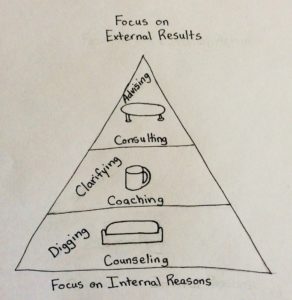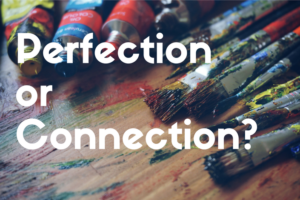
So what’s all this hype about life coaching?
You may hear people talk about having a life coach and you may think of life coaching as something that’s only for only high powered CEOs or narcissistic housewives. But as our culture shifts, we are finding that people are living longer, are faced with more life options, and have more life transitions than people of past generations.
Nowadays, life coaching is growing in necessity and popularity just like the cell phone. It used to be funny on the movie “Clueless” when everyone in the high school used to pick up their cell phone when they heard one ring, now the cell phone culture is part of who we are. Similarly, it used to be unheard of to go to a gym to “work out” when “working out” consisted of literally going out on the farm to work. That was all the work we needed. But life has fundamentally changed. What we once never imagined would be a necessity, is suddenly more important than we realized.
In a similar way, life coaches are becoming more and more available and more and more diverse with different specialties. You can find a health coach, a productivity coach, a performance coach, or a more generalized coach if you don’t quite know what you need yet. It is now what we’d call “mainstream.” Regular people like you and me are finding that life coaching is the one thing they’ve been looking for that is the tipping point they’ve needed for life fulfillment.
I want to give you a little better idea to know what coaching is and how it works so you can decide if coaching is right for you. Here are 3 questions and answers to help you discover if it might be time to get a coach.
1. What is Coaching?
A coaching relationship will help you self-discover ways to maximize your life. You can receive help articulating your values, passions, and goals, develop and execute a strategy to get you to the next place you want to be in your personal journey. In other words, coaching is all about you. It’s about helping you find the keys within so that you can unlock the true potential of the person you were created to be. Whether it is helping you identify and correct limiting mindsets and habits or helping to articulate and execute goals, coaching is flexible enough to meet your needs. Sometimes you just need a person who can come alongside you with no hidden agenda with your needs in mind, and to be an advocate for who you are and who you are becoming. Here at Leighsloan.com, I can provide generalized life coaching or specialty coaching such as relationship/boundary coaching, leadership coaching, and spiritual/personal growth coaching.
What is the difference between coaching and counseling? Counseling takes you deeper into the psychological issues that might be hindering you from being emotionally and psychologically healthy. Coaching may also hit on emotional or psychological issues, but the coach will not offer prescriptive advice, rather will give you a sounding board to discover the truth that is already within you. A coach will help you to listen to you. The focus of counseling is to help you become psychologically healthy. The focus of coaching is to help you identify and achieve your own personal or professional goals. A coach may also suggest other resources to assist you on your journey.

2. How do I know if I might be ready for a coach?
Short answer: If you feel just a little bit (or a lot) stuck in your old patterns of thinking or behavior, if you are doing the same thing over and over but desire different results, if you need help clarifying what it is you want from life, if you need help creating more satisfying relationships… it might be time for a life coach.
Which brings us to the real underlying question…
3. What are some barriers people typically have to deciding to get a coach?
Lack of understanding about what coaching is. Faulty mindsets about what coaching is can lead people to think that they don’t need or want a coach. Hopefully this post has already helped you clarify what coaching is and what it is not.
Self-worth issues. Often, the people that need coaching the most do not see themselves as worthy of the time and expense of a life coach. They’ll say things like, “Coaching is for other people.” Or “I need to be further along in my career to get a coach.” It’s this idea that they need to earn the right to have a coach. There are real gifts lying dormant within these individuals. 12 weeks with a life coach could be very effective to helping them get over the barriers that are preventing them from operating on all cylinders, preventing them from creating the income, lifestyle, and relationships they’ve always wanted, but never thought possible.
Fear of failure or being exposed. Sometimes we picture a football coach or those tough coaches we see in the movies as people who get in our faces and scream until we get across the finish line. And that might work for some people, but in most situations, this style of coaching is the last thing people need. Most people have the motivation already within them to accomplish what is important to them, but they lack the encouragement, permission, and relationship they need to help pull them out of their past patterns. They don’t need someone yelling in their face, but they need someone addressing their questions and concerns. Coaching also helps an individual to take themselves seriously enough to get what they need to grow.
Just by deciding that you are going to invest into your own life by pursuing a life coach says a lot about what you believe about yourself, your value, and your ability to succeed. Making the leap into a relationship with a life coach is half the battle.
You may be thinking, “How am I going to do this?” There are coaches of many different price ranges and specialties. You’re going to want to really think about what you want from the relationship and how much you’re willing to invest. Some coaches even offer group coaching which can help defray the cost. Most coaches will be able to give you a quick assessment and recommendations of what kind of coaching you might need and will have people they can refer you to if they cannot offer this service to you themselves. Sometimes pastors or employers will be able to help you with this information as well.
Reach out and send me a message if you think life coaching might be right for you. I’d love to help connect you with someone who can help. Also, let me know your thoughts, feelings, and any other questions you might be asking!
You are worth it!




